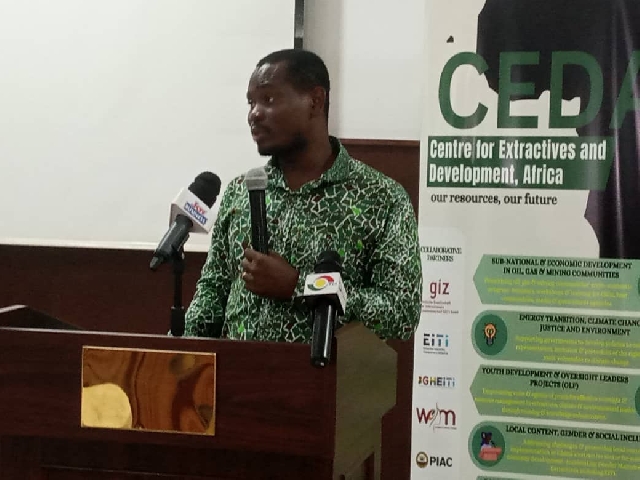CEDA highlights inefficiencies in public infrastructure projects
 Mr. Samuel Bekoe, Executive Director of CEDA
Mr. Samuel Bekoe, Executive Director of CEDA
The Centre for Extractives and Development, Africa (CEDA) held a media round table to discuss its recent research findings on the state of public infrastructure projects, including roads, hospitals, schools, and other facilities.
The session was led by Mr. Samuel Bekoe, Executive Director of CEDA.
Mr. Bekoe emphasized the importance of the Petroleum Revenue Management Act in reducing poverty and inequality through the effective use of oil revenues.
He highlighted the roles of the Northern Development Authority, the Middle Belt Development Authority, and the Coastal Development Authority in ensuring socio-economic growth across various regions.
Despite these efforts, CEDA's research unveiled significant issues.
One major problem is political interference in project selection.
In some cases, projects like market developments were built in areas where the community did not express a need, resulting in underutilization.
This political bias in needs assessment has hindered the impact on poverty and inequality reduction.
CEDA's study, which examined ten projects from each development authority, revealed a mix of successes and failures.
Notable successes include dams in the north that support agricultural activities during dry seasons and classroom blocks that are actively used, he said.
However, several projects face operational issues due to incomplete ancillary facilities, such as a surgical center without necessary surgical tools, he stressed.
he added that coordination of issues between development authorities and district assemblies were also noted, with a lack of collaboration leading to ineffective project implementation.
Additionally, he said many projects remain uncompleted due to inconsistent funding and poor project sequencing.
He noted that one positive aspect identified was the development authorities' policy of not initiating new projects until existing ones are completed, a practice other ministries could learn from.
However,he explained that the lack of continuity in funding and weak oversight remain significant challenges.
Mr. Bekoe suggested that public-private partnerships could help complete and operationalize projects, particularly market stalls.
He also recommended legislative measures to standardize procedures and reduce political interference, which could enhance the efficiency of development authorities.
Trending News

Okudzeto-Ablakwa inaugurates smart classrooms to boost STEM education in North Tongu
11:38
Activist Felicity Nelson brings Christmas comfort to Accra Police cells
08:32
First batch of large-scale mining licences to face possible revocation revealed
09:08
A/R: Kumawu MP celebrates Christmas with drivers and Okada riders
07:57
Alhaji Agongo builds lifeline facility for Ghana Police Hospital’s ‘unknown patients’
09:55
IGP Special Operations Team arrests suspect in Kpalsi over suspected Indian Hemp
07:48
Police arrest 2 suspects for unlawful possession of ammunitions
10:06
Kumawu MP shares Christmas with aged, widows in Constituency
07:39
PRINPAG President loses father
08:26
WN/R: Two school staff members arrested for theft of students' food items at Sefwi Bekwai
02:13



